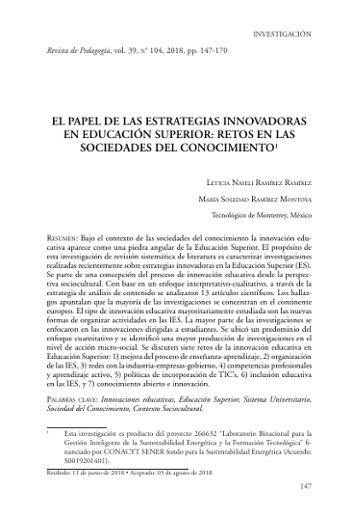Mostrar el registro sencillo del ítem
El papel de las estrategias innovadoras en educación superior:retos en las sociedades del conocimiento
| dc.contributor.author | Ramírez-Montoya, María-Soledad | |
| dc.contributor.author | Ramírez-Ramírez, Leticia Nayelli | |
| dc.date.accessioned | 2018-10-31T21:00:32Z | |
| dc.date.available | 2018-10-31T21:00:32Z | |
| dc.date.issued | 2018 | |
| dc.identifier.uri | http://hdl.handle.net/11285/630729 | |
| dc.description.abstract | In the context of knowledge societies, educational innovation appears as a cornerstone of Higher Education. The purpose of this systematic literature review research is to characterize recent research on innovative strategies in Higher Education (HE). It is grounded on a conception of the process of educational innovation from the sociocultural perspective. Based on an interpretative-qualitative approach, 13 content articles were analyzed through the content analysis strategy. The findings underline that most of the research is concentrated on the European continent. The type of educational innovation mostly studied are the new ways of organizing activities in HEIs. Most of the research focused on innovations in students. A predominance of the quantitative approach was identified as well as a greater production of research in the level of micro-social action. Seven challenges of educational innovation in higher education are discussed: 1) improvement of teaching-learning process, 2) organization of the institution of higher education, 3) networks with industry-business-government, 4) professional skills and active learning, 5) policies of incorporation of ICTs, 6) educational inclusion in HEIs, and 7) open knowledge and innovation. | |
| dc.language.iso | spa | en_US |
| dc.relation | 266632-CONACYT-SENER-S0019201401 | en_US |
| dc.rights | Open Access | en_US |
| dc.rights.uri | http://creativecommons.org/licenses/by-nc-nd/3.0/us/ | * |
| dc.title | El papel de las estrategias innovadoras en educación superior:retos en las sociedades del conocimiento | en_US |
| dc.type | Artículo / Article | en_US |
| dc.identifier.journal | Revista de Pedagogía | en_US |
| dc.subject.keyword | Educational innovations | en_US |
| dc.subject.keyword | Higher Education | en_US |
| dc.subject.keyword | University System | en_US |
| dc.subject.keyword | Knowledge Society | en_US |
| dc.subject.keyword | Socio-cultural context | en_US |
| dc.identifier.volume | 39 | en_US |
| dc.identifier.issue | 104 | en_US |
| dc.identifier.startpage | 147 | en_US |
| dc.identifier.endpage | 170 | en_US |
| dc.contributor.affiliation | Tecnológico de Monterrey | en_US |
| dc.subject.country | México / Mexico | en_US |
| dc.subject.discipline | Ciencias Sociales / Social Sciences | en_US |
| refterms.dateFOA | 2018-10-31T21:00:32Z | |
| html.description.abstract | <html> <head> <title></title> </head> <body> <p>In the context of knowledge societies, educational innovation appears as a cornerstone of Higher Education. The purpose of this systematic literature review research is to characterize recent research on innovative strategies in Higher Education (HE). It is grounded on a conception of the process of educational innovation from the sociocultural perspective. Based on an interpretative-qualitative approach, 13 content articles were analyzed through the content analysis strategy. The findings underline that most of the research is concentrated on the European continent. The type of educational innovation mostly studied are the new ways of organizing activities in HEIs. Most of the research focused on innovations in students. A predominance of the quantitative approach was identified as well as a greater production of research in the level of micro-social action. Seven challenges of educational innovation in higher education are discussed: 1) improvement of teaching-learning process, 2) organization of the institution of higher education, 3) networks with industry-business-government, 4) professional skills and active learning, 5) policies of incorporation of ICTs, 6) educational inclusion in HEIs, and 7) open knowledge and innovation.</p> </body> </html> | en_US |
Ficheros en el ítem
Este ítem aparece en la(s) siguiente(s) colección(ones)
-
Artículo 1151
Article

